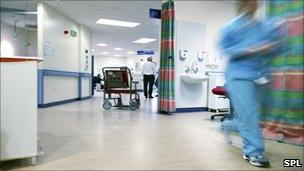Hospitals in Wales still missing A&E goals
- Published

No major hospitals met the four-hour waiting target in August
The majority of A&E departments in Wales are continuing to miss waiting time targets set by the Welsh Assembly Government back in 2003-4.
More than 9,000 patients spent more than four hours waiting to be seen in A&E departments in August, up from 5,000 a year ago, the figures show.
All of Wales' health boards missed targets of 95% of A&E patients to be seen within four hours.
The assembly government said it was reviewing emergency care services.
More than 1,600 patients were kept waiting more than eight hours in A&E departments, latest figures for showed.
The Annual Operating Framework (AOF) targets for all A&E departments in Wales state that 95% of patients should "spend no longer than four hours in a major A&E department from arrival until admission, transfer or discharge".
The AOF states that 99% of patients spend no longer than eight hours.
The AOF was established in 2003-4 but since then only a handful of A&E departments have ever met the targets.
In August none of the major A&E hospitals in Wales met the four-hour target. And all but three of the hospitals - Wrexham, Glan Clwyd and Withybush - failed to meet the eight-hour target.
'Contain costs'
Dr Stefan Coghlan, chair of British Medical Association (BMA) Wales' consultants committee, said the figures again demonstrated the continuing strain being put on NHS resources in Wales.
"Despite ever increasing demands in A&Es, little is being done to increase capacity to effectively treat patients presenting at the front door of our major hospitals," he said.
Dr Coghlan said LHBs were looking to contain costs by not replacing vital members of staff and by banning locum doctors and agency or bank staff as they attempted to balance the books.
He added: "Of course, meeting the four or eight-hour targets is less important than ensuring patients receive the correct care in an appropriate setting by skilled clinicians with the time and resources to do their job.''
The assembly government said the vast majority of patients received treatment within four hours and were either discharged or admitted.
But, a spokesman said, there would be times where they would need to wait longer as they may need tests and scans to help staff decide on the best course of treatment.
"We are reviewing emergency care services in Wales to ensure that we continue to improve patient outcomes and that they receive the right care, in the right place at the right time," said the spokesman.
"Accident and emergency targets are in place to support improvements in emergency care and the assembly government will continue to monitor the situation closely to ensure that patients are seen based on clinical need."
The spokesman added that patients needed to consider whether they needed to attend accident and emergency as many could be treated appropriately either with support from NHS Direct or through the GP out-of-hours services.